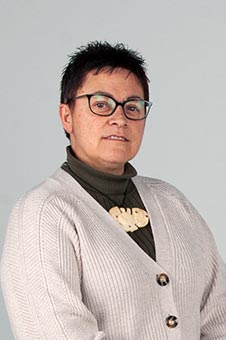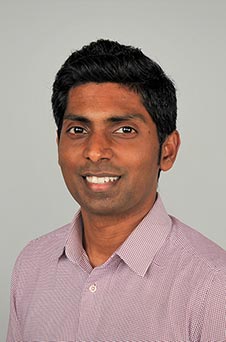Māori adults who experience chronic pain are being prescribed painkillers at the expense of best practice treatments and are not being offered referrals to specialists, research from the Māori community health provider, Tu Kotahi Māori Asthma and Research Trust and the University of Otago, Wellington has found.
The research was based on kanohi ki te kanohi face-to-face focus groups with 13 kaiāwhina community health workers, who provide a link between the health sector and Māori communities.
The kaiāwhina reported treatment of chronic pain in Māori at a primary health care level was based almost entirely on prescribing pain medication, with doctors failing to provide holistic explanations about the causes of their pain.
One kaiāwhina commented: “They do not even understand their own pain, and where it's coming from; they are just … dished out pills constantly to mask their pain.”

Cheryl Davies.
Pain researcher Dr Hemakumar Devan, a Research Fellow at the Centre for Health, Activity and Rehabilitation Research at the University's School of Physiotherapy worked on the study with Dr Tristram Ingham (Ngāti Kahungunu, Ngāti Porou) and Bernadette Jones (Ngā Wairiki, Ngāti Apa), both Senior Research Fellows in the Department of Medicine and Cheryl Davies (Ngāti Raukawa, Ngāti Mutunga ki te Wharekauri), Manager of the Tu Kotahi Māori Asthma and Research Trust. Their findings are published in the New Zealand Medical Journal.
Ms Davies says a key strength of the research was the partnership between the University and Māori community health provider Tu Kotahi Māori Asthma and Research Trust which ensured a whānau-centred approach.
Māori adults are 1.4 times more likely than non-Māori adults to report experiencing chronic pain, the 2020 New Zealand Health Survey found.
Ms Davies says very few were being offered the option of being referred on to a specialist pain clinic by their GP.
“The referrals were not coming through from the GP clinics and then at the other end, there was quite a large waiting list to even be able to access the pain clinic, if you were referred on. There were barriers all the way through the system.”

Dr Hemakumar Devan.
Dr Devan says drug treatments should be used with caution for most chronic pain conditions, partly because of potential side effects, but also because they become less effective over time.
Best practice guidelines recommend patients be supported with self-management techniques, such as pain education, encouraged to do meaningful activities despite pain, and to reframe thoughts associated with chronic pain.
The kaiāwhina told focus group facilitators that some whānau used rongoā traditional Māori methods of healing to manage their pain, but did not usually talk to their doctors about this.
One kaiāwhina reported: “Often they'll say, 'I don't really want to tell the doctor; I'll just live with it … the doctor will just give more panadol or tramadol or more prednisone' and they don't want any more medication. So they … make their own remedies. (They) might use some rongoā; that's quite useful for bringing inflammation down in your body, and they kind of ease the pain that way.”
Traditional healing methods, such as mirimiri massage, were highly valued by some whānau for managing their pain, because they not only improved tinana physical health but also wairua spiritual and hinengaro psychological wellbeing.
Ms Davies says the project has led to a pain management clinic being run at Kōkiri Marae and a whānau-focused pain management programme was held in Wainuiōmata for the first time.
“I think we are the first to hold a community pain management clinic in this way, so this study has been more than just doing the research. We have been able to implement some interventions, which has had a huge impact for our community.”
Dr Ingham notes the results of the study underpin the importance of moving away from historic notions within clinical practice of biomedical health outcomes into adopting far more complex but relevant paradigms of achieving the Government's Pae Ora Healthy Futures vision for Māori health, and holistic health outcomes.
Co-author of the research paper and a Senior Lecturer at the University's School of Physiotherapy, Dr Meredith Perry, adds the findings place a responsibility on all health professionals to consider whether their individual worldview and implicit biases may influence who they consider appropriate to refer to specialist pain services.
Dr Devan suggests introducing community-based solutions to achieve equitable outcomes. This could include providing training for kaiāwhina to provide chronic pain assessment and management in the community.
“Kaiāwhina-led pain education services could provide whānau with educational resources and facilitate communication with their primary care providers for referrals to specialist services if required.”
Publication details:
Are we just dishing out pills constantly to mask their pain? Kaiāwhina Māori health workers' perspectives on pain management for Māori
New Zealand Medical Journal
For further information, contact:
Dr Hemakumar Devan
Research Fellow
Centre for Health, Activity and Rehabilitation Research
School of Physiotherapy
University of Otago, Wellington
Email hemakumar.devan@otago.ac.nz
Cheryl Davies
Tu Kotahi Māori Asthma and Research Trust
Email cheryl@kokiri-hauora.org.nz
Cheryl Norrie
Communications Adviser
University of Otago, Wellington
Mob +64 21 249 6787
Email cheryl.norrie@otago.ac.nz
Find an Otago expert
Use our Media Expertise Database to find an Otago researcher for media comment.